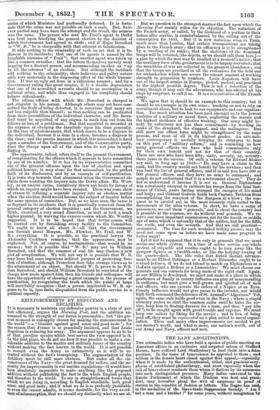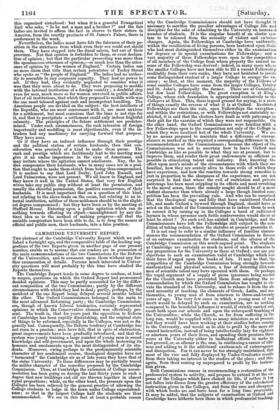THE LADY ABOLITIONISTS.
Tics estimable ladies who have held a species of public meeting on American affairs in an exclusive and carpeted saloon of Stafford House, have suffered Lord Shaftesbury to lead them into a false position. In the name of benevolence he appealed to them ; and seldom is the female heart closed against that appeal,—espeniplly when it is made by the authenticated, titled, and gracious cory- Owns of established philanthropy, and most especially when the call of benevolence conducts those whom it flatters by its summons into such distinguished presence. Many ladies convened to the female Parliament of which the Duchess was host and presi- dent, may hereafter plead the writ of summons in proof of station in the republic of fashion or letters. The Negro has said, in the medallion of the Slave-trade Suppression Society, "Am I not a man and a brother r for some years, without recognition by
this organized sisterhood: but when it is a graceful Evangelical Earl who asks "Is he not a man and a brother P" and the fair ladies are invited to affirm the fact in chorus to their sisters in America, from the courtly precincts of St. Xames's Palace, there is preferment in the work. Nevertheless, the ladies must have felt the falseness of their po- sition in the strictures from which even their sex could not shield them. They have steppe id into the ducal saloon, but out of their province. Not that opinion is forbidden to them or even declara- tion of opinion ; but that the particular proceeding was more than the spontaneous utterance of opinion,—or much less than the utter- ance of opinion by "the women of England." Certain ladies can no more claim that title than certain potentates of Tooley Street who spoke as "the people of England." The ladies had no author- ity to assemble in any corporate capacity. They had no power to act. If they had, they evidently neglected to consider what it was that they were about to do. They were proposing to meddle with the internal institution of a foreign country ; a doubtful step even for men, much more so for women unversed in public affairs. But of all institutions, that which they proposed to meddle with was the one most tabooed against rash and incompetent handling. The American people are divided on the subject: the best intellects of the Republic, who are most conversant with it, are most anxious for a settlement, but most conscious that the time is not ripe for it, and that to precipitate a settlement could only induce frightful calamity. The principles of the future settlement are predeter- mined.. Under such circumstances, the rash intrusion of foreign importunity and meddling is most objectionable, even if the in- truders had any machinery for carrying forward that purpose. They have none. Or if they have an indirect influence through their prestige and the political station of certain husbands, then that con- sideration was precisely of a kind to make them pause. The rank and prestige which are factitiously lent to the meeting may give it an undue importance in the eyes of Americans, and may irritate where the agitation cannot ameliorate. Nay, the la- dies compromise their husbands, who in many cases are in a posi- tion that ought to make them shrink from being thus compromised. It is useless to say that Lord Derby, Lord John Russell, and Lord Palmerston, were not present. We all know in England, and they know it well in the United States that very few English wives take any public step without at least the permission, and usually the cheerful permission the positive concurrence, of their husbands. It is most important that on a question of this kind, not relating to the slave-trade on the ocean, but relating to an in- ternal institution, neither of those noblemen should be in the slight- est degree compromised : but they have been so by the meeting at Stafford House. Entering upon a polite agitation which can do nothing towards effecting its object—unenlightened by any dis- tinct idea as to the method of making progress—all that the amiable conspirators have been able to do, is to drag the names of official and public men, their husbands, into a false position.



































 Previous page
Previous page